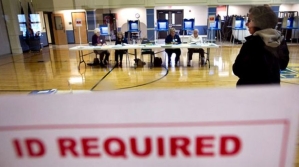
This voter ID law in Texas that made only seven types of identification acceptable in order to vote is reinstated. Those who oppose this law say it may disenfranchise hundreds of voters, many of them being people of color. Student ID's are not one of the seven acceptable forms of identification, so students with only this ID will not be allowed to vote in Texas.
Changing this law so close to the election date is risky and might confuse voters, according to the Firth Circuit Court. U.S. District Judge Nevla Gonzales Ramos, resolved the 2011 Texas voter law is unconstitutional, based upon the Voter right's Act. She went on to say "[This law] constitutes an unconstitutional poll tax," The states argument's that this law was put into place in order to help stop in-person voter fraud.
The plaintiff court found the harm caused by this law doesn't outweigh the damage a change in legislation so close to the election would make. The appellant court's ruling was "individual voter plaintiffs may be harmed by the issuance of this stay," and "This is not a run-of-the-mill case; instead, it is a voting case decided on the eve of the election."
Texas is not the only state that is having issues relating to voting laws so close to this election. On the same day Texas had it's ruling, the US Supreme Court ruled to block a voter ID law in Wisconsin that could have disenfranchised over 300,000 residents. Total, there are seven states effected by teetering voter laws.
In addition to that, According to the Brennan Center For Justice, there are 14 states with new voting restrictions this year. A few days before this, the US Supreme Court ruled to let a North Carolina sweeping voting law stand, and supporters argued that it's disenfranchised minority voters.
"I expect we're going to see some difficulties [on Election Day] as a result of those changes," Wendy Weiser, director of the Brennan Center's Democracy Program.
The Brennan Center does not support these laws. Changing laws so close to an election is not best practice. Weiser said, "Any time you have significant changes to voting practices, there's going to be some confusion... until everybody learns the new system."
A similar scenario happened in Pennsylvania in the 2012 election, when the state's voting ID laws were blocked. At the time, some Poll workers required ID's or improperly made them use interim ballots.
During this election season, make sure you check with you local governing agency to ensure that you are properly registered to vote, and have all the necessary ID and paperwork.







